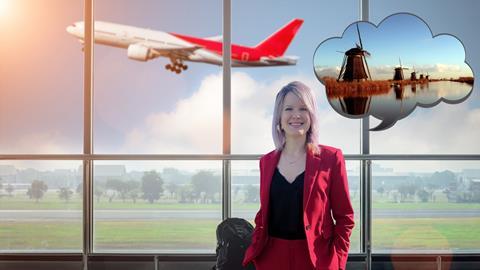On the occasion of her 10th anniversary in the Netherlands, Isabelle Kohler delves into her memories and recalls her first steps in the country. She also offers advice to international (PhD) students to help them settle into their new academic and cultural environment.
This month marks 10 years since I moved to the Netherlands! I have now spent more than a quarter of my life abroad – which is quite surprising, given that my original plan was to stay for 2-3 years and then return to Switzerland.
This anniversary brings back a cascade of memories. It was a monumental step for me to move to a new country, and the first few months were not without hurdles – mostly of a bureaucratic nature. Working in the Netherlands on a Swiss grant turned out to be a nightmare in terms of taxes, insurance, and social security. I can still remember the number of fines I received from the Dutch Social Insurance Bank in the first few months because they could not understand why I was still insured in another country while working in the Netherlands.
Fortunately, what I remember now are mostly the positive aspects of this adventure. It has certainly redefined my career and my life; I have also made a lot of great connections along the way. This journey has been truly transformative!
As a supervisor and teacher of (PhD) students from abroad, I am always impressed by the motivation, maturity, drive, and courage of international students. Some of them left their country at the age of 18 or 19! It took me 28 years to take that step! I have a deep respect for these students who land in a new country with a different culture and language, far from their family and friends, without excellent command of English (for many), and while pursuing intensive studies or a PhD.
If you are an international (PhD) student reading this, I would like to give you some tips to help you settle into your new academic and cultural environment. Are you Dutch but in contact with international colleagues? Read on, I have some tips for you too!
- Join the social gatherings organized by your host lab or study program. Engage in informal social events organized by your host institute or student associations. Joining an event where you do not know many people may feel awkward at first, but it offers great opportunities to meet new people, connect on a deeper level with colleagues, have fun, and gain insights into the institute’s culture.
- Meet new friends (expats and locals) via non-academic associations. Looking for new friends outside of university? Consider joining associations such as Girl Gone International (GGI) or MeetUp. These groups offer opportunities to interact with both expats and residents. GGI and MeetUp are present in many Dutch cities and frequently host events and activities, providing a chance to meet new people from all around the world. Connecting with locals is great, but sometimes it is also nice to talk with other expats who have gone through similar challenges. Additionally, this can help you discover new spots in your host city without additional effort!
- Get in touch with the International Office of your institute. Dutch universities and academic institutions typically have an International Office that offers resources on a wide range of topics, including immigration requirements and cultural assimilation. Check their online resources and contact them for support if needed. They are available to assist you and likely have answers to all your questions.
- Join networking events (symposia, presentation from a guest speaker, etc.) at your host institution. These events provide an excellent opportunity to learn more about science and meet people who share your academic interests, even if they are not your direct colleagues. Most events are free and low-key. If you are an introvert and feel uncomfortable attending alone, bring a colleague with you.
- Try to learn (some words of) the local language. If you are not a native English speaker, it can be challenging and tiring to function in an English-speaking environment. If you are pursuing your master’s or PhD in the Netherlands, you will also have to deal with the Dutch language. Although everyone speaks English here, you will feel more integrated if you learn (or at least show that you are trying to learn) some Dutch words. Therefore, consider joining language classes to start learning Dutch! This will also allow you to meet other expats, develop new skills, have fun, and feel more integrated. Additionally, PhD students may be eligible for financial support for language courses through their host institutions. I recommend you contact the International Office or supervisor(s) to explore available options.
- Introduce your colleagues to your (culinary) culture. Do you have a special occasion to celebrate, for instance your birthday or an important event in your home country? Take this opportunity to bring a culinary item from your native country. This will give you the chance to share a bit of your story and culture with your colleagues. Sharing food has something magical. It can initiate dialogues and foster deeper connections.
- Ask your local colleagues to help you with administrative procedures. Bureaucratic tasks are often written in Dutch, which can be challenging. If you do not understand something or need help, do not hesitate to ask your colleagues or supervisor. Seeking assistance can help you navigate administrative processes more efficiently and effectively. It is always better to be safe than sorry and avoid making costly mistakes.
- Seek the guidance of other (senior) expats. Relocating to a new country can be a challenging process, especially the first time. Look for colleagues, supervisors or mentors who have been through a similar journey and do not hesitate to ask for help if you need it. Those who have been through it before can offer valuable support and advice.
- Learn more about cultural differences. Moving to another country often results in experiencing culture shock. It can be amusing at times, but at other times, it can be frustrating. To prepare yourself, try to find out more about the host culture by reading online or asking your new colleagues. Erin Meyer’s book, The Culture Map, provides an excellent analysis of cultural differences, particularly in professional settings, and how they can impact your work. You can even discuss the outcomes with your international colleagues, to see whether the theories developed in the book translate into reality!
- Be kind to yourself and practice self-care. Relocating to a foreign country is a significant life change, especially when starting a new professional/career chapter. You may experience moments of both joy and homesickness, missing your family, friends, pets, and familiar surroundings. Be kind to yourself and allow yourself to feel all emotions, positive and negative. If you are feeling lost or alone, try connecting with other expats. You can also share your feelings with your colleagues or supervisors/teachers if you think they can help.
Are you surrounded by international colleagues? I strongly encourage you to adopt a welcoming and inclusive attitude by being patient and helpful. Switch to English in conversations to accommodate non-Dutch speakers when they arrive. Having lunch or a coffee break with people who speak and laugh in a different language can be very hurtful. This attitude will not help them learn Dutch. They will feel more welcome and motivated to learn the language in an environment of mutual respect and understanding.
I am happy to have the opportunity to celebrate a decade of growth. Reflecting on my 10 years in the Netherlands, the journey from an outsider to a quite well-integrated member of the academic community has been rewarding. The challenges along the way have only enriched my experience and taught me great lessons in resilience, adaptability, and the importance of building connections.
To those embarking on this journey, embrace the adventure with an open heart and mind! The road ahead is not just about academic or professional development: it is a journey of personal growth and cultural exchange.
If you are interested in learning more about how to navigate academia (in the Netherlands or abroad), do not hesitate to join the NextMinds Community! For this, you have plenty of choices: visit NextMinds website to learn more about my work, sign up to the weekly newsletter, and follow me and NextMinds on LinkedIn.



















Nog geen opmerkingen